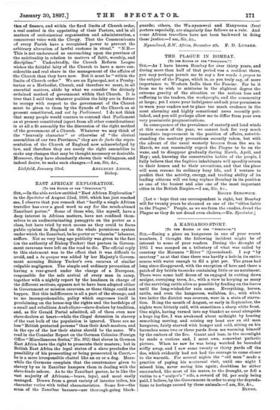EAST AFRICAN EXPLORATION.
[To THZ EDITOR Or THZ " SPECTAITOR."] the able review entitled "East African Exploration" in the Spectator of August 22nd, 189G, which has just reached -me, I observe that you remark that 'hardly a single African traveller has ever a good word to say for the much-abused Zanzibari porter." Some of those who, like myself, have a deep interest in African matters, have not confined them- selves to an undiscriminating panegyric on the porter as a class, but have tried by such means as they could to focus public opinion in England on the whole pernicious system under which the Zanzibari, be he porter or " shamba" labourer, suffers. Not so very long ago publicity was given to the fact (on the authority of Bishop Tucker) that porters in Govern- ment caravans were left on the road to die. The official reply -to this statement was to the effect that it was difficult to avoid, and a tu quo que was added by her Majesty's Govern- ment accusing Bishop Tucker's own caravan of similar culpable negligence. The simple and ordinary precaution of having a rear-guard under the charge of a European, "responsible for the safe arrival of every man in camp, together with a nightly report by the headmen in charge of the different sections, appears not to have been adopted either in Government or mission caravans, or these things could not happen. But this indifference is all a part of the strange, and to me incomprehensible, policy which engrosses itself in proclaiming on the house-top the rights and the hardships of a small and rebellions Arab clique—slave-dealers by tradition, and, as Sir Gerald Portal admitted, all of them even now slave-dealers at heart—while the illegal detention in slavery of the vast bulk of the population is ignored. These are no less "British protected persons" than their Arab masters, and in the eye of the law their status should be the same. We read in the Consular Report on the German Colonies (Foreign Office "Miscellaneous Series," No. 382) that slaves in German East Africa have the right to prosecute their masters; but in British East Africa the legal status of a slave precludes the possibility of his prosecuting or being prosecuted in Court,— he is a mere irresponsible chattel like an ox or a dog. Mean- while the Germans complain that the countenance given to slavery by us in Zanzibar hampers them in dealing with the slave-trade ashore. As to the Zanzibari porter, he is like the vast majority of Africans,—brave, loyal, and most easily managed. Drawn from a great variety of interior tribes, his character varies with tribal characteristics. Some few—the scum of the Zanzibar bazaars—are thorough-going black-
guards; others, the Wa-nyamwezi and Manyuema (free) porters especially, are singularly fine fellows as a rule. And some African travellers have not been backward in doing these justice.—I am, Sir, &c.,
Ngamiland, S.W. Africa, December 4th. F. D. LIJGA.RD.


















































 Previous page
Previous page